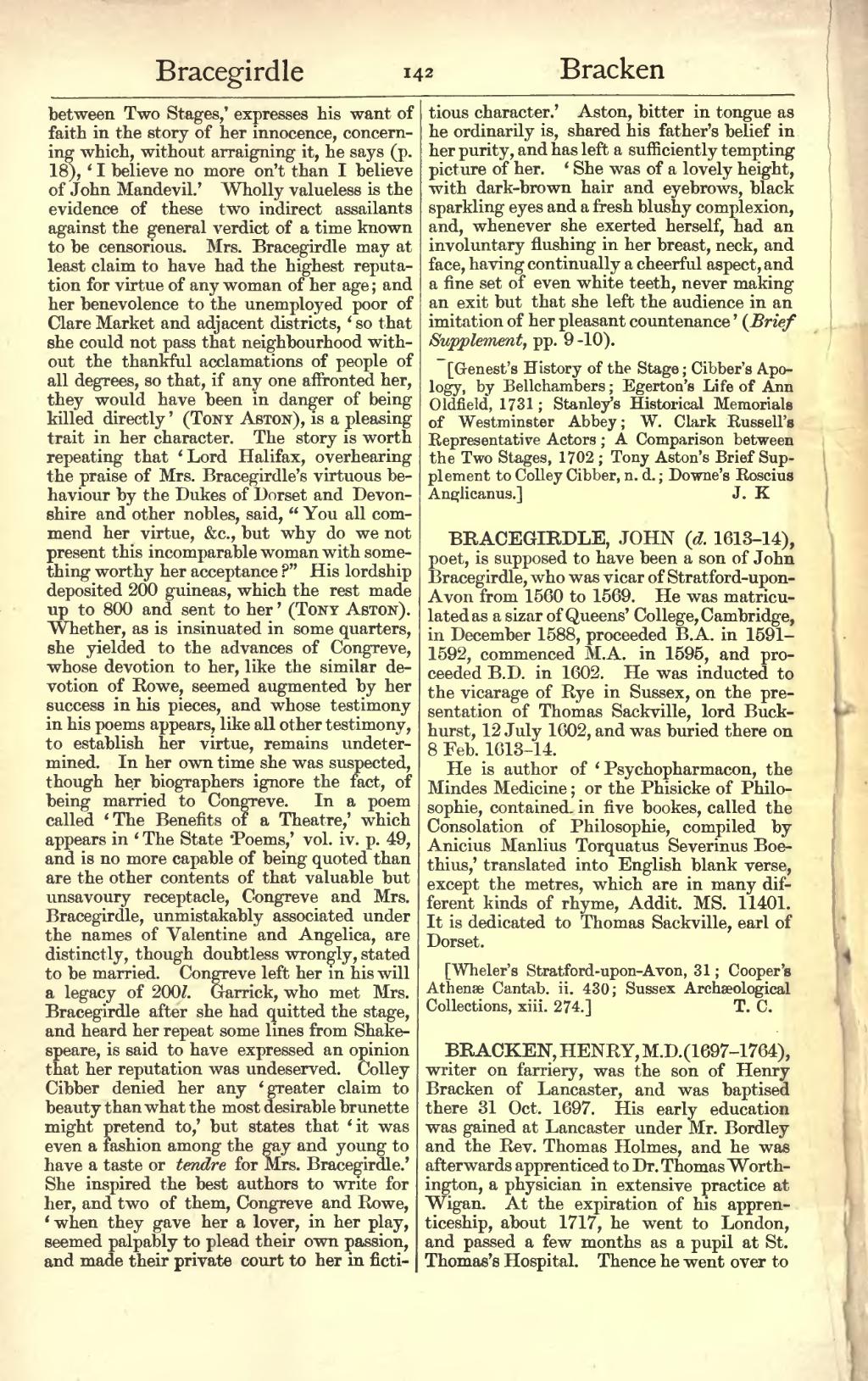between Two Stages,' expresses his want of faith in the story of her innocence, concerning which, without arraigning it, he says (p. 18), 'I believe no more on't than I believe of John Mandevil.' Wholly valueless is the evidence of these two indirect assailants against the general verdict of a time known to be censorious. Mrs. Bracegirdle may at least claim to have had the highest reputation for virtue of any woman of her age; and her benevolence to the unemployed poor of Clare Market and adjacent districts, 'so that she could not pass that neighbourhood without the thankful acclamations of people of all degrees, so that, if any one affronted her, they would have been in danger of being killed directly ' (Tony Aston), is a pleasing trait in her character. The story is worth repeating that 'Lord Halifax, overhearing the praise of Mrs. Bracegirdle's virtuous behaviour by the Dukes of Dorset and Devonshire and other nobles, said, "You all commend her virtue, &c., but why do we not present this incomparable woman with something worthy her acceptance?" His lordship deposited 200 guineas, which the rest made up to 800 and sent to her' (Tony Aston). Whether, as is insinuated in some quarters, she yielded to the advances of Congreve, whose devotion to her, like the similar devotion of Howe, seemed augmented by her success in his pieces, and whose testimony in his poems appears, like all other testimony, to establish her virtue, remains undetermined. In her own time she was suspected, though her biographers ignore the fact, of being married to Congreve. In a poem called 'The Benefits of a Theatre,' which appears in 'The State Poems,' vol. iv. p. 49, and is no more capable of being quoted than are the other contents of that valuable but unsavoury receptacle, Congreve and Mrs. Bracegirdle, unmistakably associated under the names of Valentine and Angelica, are distinctly, though doubtless wrongly, stated to be married. Congreve left her in his will a legacy of 200l. Garrick, who met Mrs. Bracegirdle after she had quitted the stage, and heard her repeat some lines from Shakespeare, is said to have expressed an opinion that her reputation was undeserved. Colley Cibber denied her any 'greater claim to beauty than what the most desirable brunette might pretend to,' but states that 'it was even a fashion among the gay and young to have a taste or tendre for Mrs. Bracegirdle.' She inspired the best authors to write for her, and two of them, Congreve and Rowe, 'when they gave her a lover, in her play, seemed palpably to plead their own passion, and made their private court to her in fictitious character.' Aston, bitter in tongue as he ordinarily is, shared his father's belief in her purity, and has left a sufficiently tempting picture of her. 'She was of a lovely height, with dark-brown hair and eyebrows, black sparkling eyes and a fresh blushy complexion, and, whenever she exerted herself, had an involuntary flushing in her breast, neck, and face, having continually a cheerful aspect, and a fine set of even white teeth, never making an exit but that she left the audience in an imitation of her pleasant countenance' (Brief Supplement, pp. 9-10).
[Genest's History of the Stage; Cibber's Apology, by Bellchambers; Egerton's Life of Ann Oldfield, 1731; Stanley's Historical Memorials of Westminster Abbey; W. Clark Russell's Representative Actors ; A Comparison between the Two Stages, 1702; Tony Aston's Brief Supplement to Colley Cibber, n. d.; Downe's Roscius Anglicanus.]
BRACEGIRDLE, JOHN (d. 1613–14), poet, is supposed to have been a son of John Bracegirdle, who was vicar of Stratford-upon-Avon from 1560 to 1569. He was matriculated as a sizar of Queens' College, Cambridge, in December 1588, proceeded B.A. in 1591-1592, commenced M.A. in 1595, and proceeded B.D. in 1602. He was inducted to the vicarage of Rye in Sussex, on the presentation of Thomas Sackville, lord Buckhurst, 12 July 1602, and was buried there on 8 Feb. 1613-14.
He is author of 'Psychopharmacon, the Mindes Medicine; or the Phisicke of Philosophie, contained, in five bookes, called the Consolation of Philosophie, compiled by Anicius Manlius Torquatus Severinus Boethius,' translated into English blank verse, except the metres, which are in many different kinds of rhyme, Addit. MS. 11401. It is dedicated to Thomas Sackville, earl of Dorset.
[Wheler's Stratford-upon-Avon, 31; Cooper's Athenæ Cantab. ii. 430; Sussex Archæological Collections, xiii. 274.]
BRACKEN, HENRY, M.D. (1697–1764), writer on farriery, was the son of Henry Bracken of Lancaster, and was baptised there 31 Oct. 1697. His early education was gained at Lancaster under Mr. Bordley and the Rev. Thomas Holmes, and he was afterwards apprenticed to Dr. Thomas Worthington, a physician in extensive practice at Wigan. At the expiration of his apprenticeship, about 1717, he went to London, and passed a few months as a pupil at St. Thomas's Hospital. Thence he went over to
